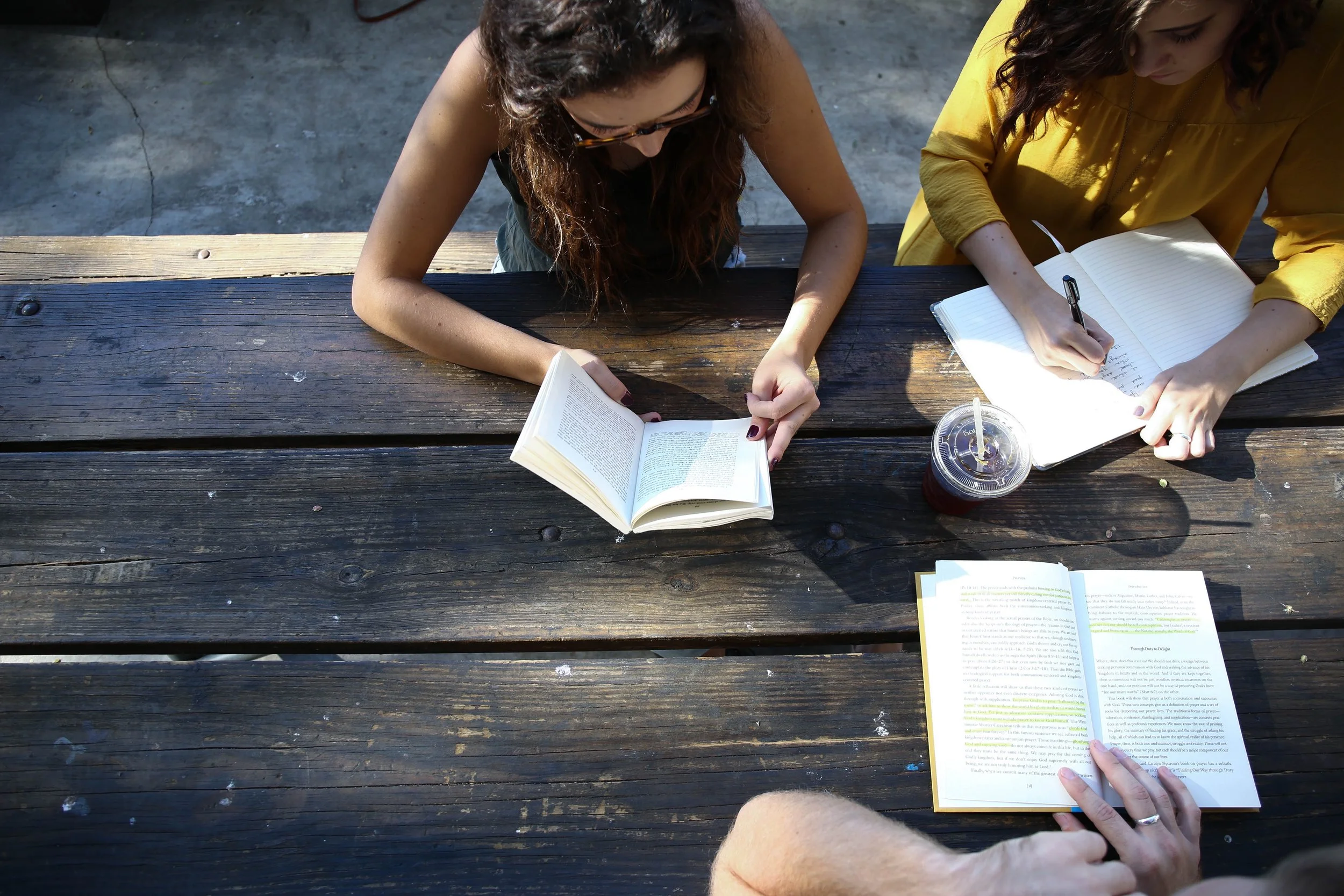WHY STAYING FOCUSED IS SO HARD (AND THAT'S OKAY)
You know this feeling, right? You sit down with your textbooks, laptop is open, phone is somewhere far away (maybe), and you tell yourself: "Okay, today I will study for four hours straight." But then twenty minutes later you're thinking about what to eat for dinner, checking if anyone messaged you, or suddenly remembering you need to organize your desk right now. I've been there so many times, and honestly, it made me feel like something was wrong with me.
But here's what I learned after talking with other students across Canada - from Vancouver to Halifax - we all struggle with this. The problem is not that we're lazy or don't care about our studies. Our brains are just not built for sitting still and focusing on one thing for many hours. And this is actually good news, because once you understand this, you can work with your brain instead of fighting against it.
During my time studying in Toronto, I tried everything - from fancy apps that cost money to weird study methods I found on internet. Some things worked, some didn't work at all. What I want to share with you today are the simple methods that actually helped me and many other students I know. No complicated systems, no expensive tools, just real advice that works.
The most important thing I discovered? Staying focused during long study sessions is not about being perfect. It's about being smart with your time and energy, understanding when your brain needs break, and not feeling guilty about it. Let's talk about how to do this.
PREPARE YOUR SPACE LIKE YOU MEAN IT
First thing first - your study space matters more than you think. I used to study in my bed, on couch, sometimes at kitchen table while my roommate was cooking. And I was always wondering why I couldn't focus. Well, surprise surprise, your environment affects your brain a lot.
You don't need fancy desk or expensive chair to create good study space. What you need is consistency and intention. Choose one place that will be your study spot. It can be corner of your bedroom, spot at library, or table at local coffee shop. The important part is that when you go there, your brain knows: this is where we work.
Make sure you have good light. This sounds so simple but it's huge. In Canada, especially during winter months, we don't get much natural light. I bought cheap desk lamp from IKEA and it changed everything for me. When your eyes don't have to work hard to see what you're reading, your brain has more energy for actual studying.
Keep your study space clean, but don't go crazy about it. I'm not saying you need to organize everything perfectly - I know I can't do that. Just make sure you have enough space for your materials and you're not surrounded by things that will distract you. Put your phone in drawer or at least turn it face down. Remove snacks that you will keep eating without thinking. Keep only water or tea near you.
THE TEMPERATURE TRICK NOBODY TALKS ABOUT
Here's something interesting I noticed - temperature affects my focus a lot. When room is too warm, I get sleepy. When it's too cold, I can't stop thinking about how cold I am. For me, slightly cool room works best - around 20-21 degrees Celsius. Your perfect temperature might be different, so pay attention to this. Many libraries and study spaces in Canadian universities let you choose different areas, so find spot that feels comfortable for you.
WORK WITH YOUR BRAIN'S NATURAL RHYTHM
Okay, this is where it gets really interesting. Your brain has natural cycles of focus and rest. It's called ultradian rhythm, and it's about 90-120 minutes long. This means your brain can focus really well for certain period, then it needs break, then it can focus again. When I learned about this, so many things started making sense.
I used to force myself to study for three or four hours without break, thinking this was being productive. But actually, I was just sitting there, reading same paragraph five times and not remembering anything. Now I work in blocks - usually 50 minutes of focused work, then 10 minutes break. Sometimes I do 25 minutes work and 5 minutes break if material is very difficult.
During these work blocks, I'm fully focused. I don't check phone, I don't start talking to people, I don't let myself get distracted. But I also know that after 50 minutes, I will have break, so it's easier to stay focused. It's like telling your brain: "Hey, we just need to focus for this short time, then you can rest."
WHAT TO DO DURING BREAKS (THIS IS IMPORTANT)
Your breaks should actually be breaks. Don't use this time to check social media or watch videos on your phone. I know this sounds hard, but trust me on this one. When you look at your phone during break, your brain doesn't really rest. It just switches to different type of work.
Instead, do something physical. Stand up, walk around, do few stretches. If you're studying at home, maybe do some dishes or water your plants. If you're in library, walk to different floor or go outside for minute. The point is to move your body and let your eyes look at something far away.
I like to use my breaks to make tea or just stand by window and look outside. In winter, watching snow fall is actually very relaxing. In summer, I sometimes go outside for quick walk. These simple activities help my brain reset and prepare for next study session.
EAT AND DRINK SMART (NOT JUST COFFEE)
Let's talk about food and drinks because this affects your focus more than you might think. I used to drink three or four cups of coffee during long study sessions, thinking it will help me stay focused. All it did was make me feel nervous and shaky, and then I would crash and feel even more tired.
Now I'm more careful with caffeine. I have one cup of coffee or tea in morning, and that's it. If I'm studying in afternoon or evening, I drink water or herbal tea. Your brain needs water to work properly - this is not just something people say, it's actually true. When you're even little bit dehydrated, your concentration gets worse.
About food - I learned that eating heavy meal before studying makes me sleepy. And studying on empty stomach makes me think only about food. So I try to eat something light but filling about hour before I start studying. Things like yogurt with nuts, apple with peanut butter, or sandwich with vegetables work well for me.
SNACKS THAT ACTUALLY HELP
If you get hungry during study session, choose snacks that won't make your blood sugar go crazy. I keep nuts, dried fruits, or cut vegetables near me. Yes, I know chips or chocolate sound more exciting, but they will make you feel tired after short energy spike. Save the good snacks as reward for after you finish studying.
USE MUSIC AND SOUNDS CAREFULLY
This one is very personal, and what works for me might not work for you. I used to think I need complete silence to study, but actually, some background sound helps me focus better. Complete silence makes me notice every small noise, and then I get distracted by them.
I discovered that instrumental music works really well for me. Music with words in language I understand is too distracting - my brain wants to listen to lyrics. But classical music, jazz, or electronic music without vocals helps me stay in zone. There are many playlists on Spotify or YouTube specifically made for studying.
Some people I know prefer white noise or nature sounds - like rain, ocean waves, or forest sounds. You can find these for free online. The trick is to keep volume low. Music should be in background, not demanding your attention.
WHEN SILENCE IS BETTER
For some types of studying, silence really is better. When I'm learning new difficult concept or trying to memorize something, I turn off all sounds. My brain needs all its energy for this work, and even gentle background music becomes distraction. Pay attention to what you're studying and adjust accordingly.
MAKE BORING MATERIAL MORE INTERESTING
Let's be honest - not everything we need to study is interesting. Sometimes you have to read chapter about something you don't care about at all, or memorize information that seems useless. This is hardest time to stay focused because your brain is like "why are we doing this?"
What helps me is trying to connect boring material to something I actually care about. Even if connection is weird or doesn't make complete sense, it gives my brain something to hold onto. For example, when I was studying statistics (which I found very boring), I started thinking about how I could use these concepts to understand if product reviews online are reliable. Suddenly it became more interesting.
Another thing that works is explaining material to yourself out loud, like you're teaching someone else. This sounds weird, but it really helps. When you have to put concepts into your own words, your brain engages more with material. I do this when I'm studying alone at home. If you're in library, you can write explanation instead of saying it out loud.
THE REWARD SYSTEM THAT WORKS
Give yourself real rewards for finishing difficult study sessions. Not just "good job" in your head, but actual reward. After I finish studying hard material for two hours, I let myself watch episode of show I like, or call friend, or go for walk somewhere nice. Having something specific to look forward to makes it easier to push through boring parts.
KNOW WHEN TO STOP (YES, REALLY)
This might sound strange in article about staying focused during long study sessions, but knowing when to stop is super important. There's point where continuing to study becomes waste of time because your brain just can't take in more information.
I learned this hard way during exam period. I was trying to study for eight hours straight, thinking more time equals better results. But after certain point, I wasn't really studying anymore. I was just staring at pages, feeling stressed, and not remembering anything. Next day I would try to recall what I studied and realize I remembered almost nothing from last few hours.
Now I pay attention to signs that my brain is done. When I read same sentence three times and still don't know what it says, that's sign. When I start feeling frustrated or anxious for no clear reason, that's sign. When I catch myself thinking about completely random things, that's sign. When these things happen, even after taking break, it means I need to stop for day.
QUALITY OVER QUANTITY ALWAYS
Four hours of focused, quality studying is much better than eight hours of half-focused, frustrated studying. This took me long time to accept because I felt guilty about "not studying enough." But once I started focusing on quality instead of quantity, my grades actually got better and I felt less stressed.
DEALING WITH DISTRACTIONS (THE REAL TALK)
Let's talk about elephant in room - your phone. I know everyone says "just put your phone away" but it's not that simple, right? We use our phones for everything - calculator, dictionary, looking up information we need for studying. So completely removing phone is not always realistic.
What works for me is putting phone in different mode during study sessions. I turn off all notifications except calls from my family (because emergencies can happen). I put phone face down so I don't see screen lighting up. And I make rule for myself - I can use phone only for study-related things during work blocks, and only if I really need it.
If you really struggle with phone (and many of us do), there are apps that can help. Some apps block distracting apps for certain time period. Some apps show you how much time you're wasting on phone. I used Forest app for while - it grows virtual tree while you're not using phone, and tree dies if you use phone. It sounds silly, but it actually worked for me because I didn't want to kill my tree.
WHAT ABOUT OTHER DISTRACTIONS
Sometimes distractions come from things you can't control - noisy roommates, construction outside, people talking in library. For these situations, good headphones are worth investing in. You don't need expensive noise-cancelling ones (though they're nice if you can afford them). Even basic headphones with white noise or study music playing can help block out background noise.
If you're studying at home and people keep interrupting you, have honest conversation with them. Tell your roommates or family: "I need to study from 2 to 4 PM today, please don't disturb me unless it's emergency." Most people will respect this if you communicate clearly.
THE MENTAL GAME - DEALING WITH YOUR THOUGHTS
Okay, so we talked about physical space, breaks, food, all the practical stuff. But sometimes biggest distraction is your own mind. Your thoughts keep wandering, you start worrying about other things, or you feel overwhelmed by how much you need to study.
This happens to everyone, and it's completely normal. Your brain is designed to think about many things, not just focus on one thing for hours. The trick is not to get frustrated with yourself when your mind wanders. Getting frustrated just makes it worse and creates negative association with studying.
When I notice my mind wandering, I don't judge myself for it. I just acknowledge it - "okay, my mind wandered" - and gently bring my attention back to what I was studying. Sometimes I need to do this five times in ten minutes, and that's okay. It's like training muscle - the more you practice bringing your attention back, the easier it becomes.
DEALING WITH STUDY ANXIETY
If you feel anxious or overwhelmed while studying, take moment to breathe. I know this sounds like generic advice, but it really helps. Take few deep breaths, remind yourself that you're doing your best, and that it's okay to find things difficult. Studying is supposed to be challenging - that's how learning works.
Sometimes I write down my worried thoughts on paper and tell myself I'll deal with them after study session. This helps get them out of my head so I can focus on studying. After I finish studying, I can look at list and decide what actually needs my attention and what was just anxiety talking.
MOVING FORWARD WITH CONFIDENCE
So here we are at the end of this article, and I hope you found something useful here. The main thing I want you to remember is that staying focused during long study sessions is skill you can develop. It won't be perfect from day one, and that's completely fine. Some days will be better than others, and that's also fine.
Start with one or two things from this article that resonated with you most. Maybe it's setting up better study space, or trying the 50-10 break system, or being more careful with caffeine. Try it for week and see how it feels. Then add another strategy. Building good study habits takes time, but it's worth it.
Remember that everyone's brain works little bit differently. What works perfectly for me might not work for you, and that's okay. Use this article as starting point, experiment with different approaches, and pay attention to what actually helps you focus better. Be patient with yourself and celebrate small improvements. You got this!




